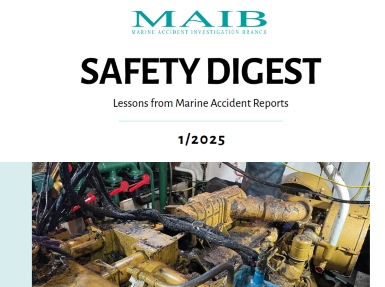 The Norwegian Government introduces zero-emission requirements in the World Heritage fjords. In a circular the Norwegian Maritime Authority (NMA) confirmed the changes will be effective from 1 January 2026 for passenger ships of less than 10,000 gross tonnage and from 1 January 2032 for passenger ships of 10,000 gross tonnage and upwards. Continue reading “Norwegian Government introduces zero-emission requirements”
The Norwegian Government introduces zero-emission requirements in the World Heritage fjords. In a circular the Norwegian Maritime Authority (NMA) confirmed the changes will be effective from 1 January 2026 for passenger ships of less than 10,000 gross tonnage and from 1 January 2032 for passenger ships of 10,000 gross tonnage and upwards. Continue reading “Norwegian Government introduces zero-emission requirements”
News
New Arbitration Act 2025: Key changes for maritime arbitrations
 According to West P&I Club, the new UK Arbitration Act 2025 received Royal Assent on 24 February 2025 and will come into force most likely at some point later this year. The 2025 Act will not be a standalone Act but, rather, inserts amendments to the 1996 Act so as to enact the recommendations of the Law Commission codifying the common law position and eliminating ambiguity. As such, the 2025 Act will modernise arbitration in London to maintain its competitiveness as a seat for international arbitrations. Continue reading “New Arbitration Act 2025: Key changes for maritime arbitrations”
According to West P&I Club, the new UK Arbitration Act 2025 received Royal Assent on 24 February 2025 and will come into force most likely at some point later this year. The 2025 Act will not be a standalone Act but, rather, inserts amendments to the 1996 Act so as to enact the recommendations of the Law Commission codifying the common law position and eliminating ambiguity. As such, the 2025 Act will modernise arbitration in London to maintain its competitiveness as a seat for international arbitrations. Continue reading “New Arbitration Act 2025: Key changes for maritime arbitrations”
Lloyd’s Register summary report on MEPC 83
 The IMO Marine Environment Protection Committee (MEPC) 83 session was held from 7-11 April 2025. The IMO MEPC is where the reduction of shipping’s impact on the marine environment is discussed. MEPC oversees the work of several sub-committees and influences subjects which cut-across the work of several committees, covering many key regulations.
The IMO Marine Environment Protection Committee (MEPC) 83 session was held from 7-11 April 2025. The IMO MEPC is where the reduction of shipping’s impact on the marine environment is discussed. MEPC oversees the work of several sub-committees and influences subjects which cut-across the work of several committees, covering many key regulations.
And Lloyd’s Register has published a summary of the outcomes from the meeting. Continue reading “Lloyd’s Register summary report on MEPC 83”
Vehicle Carrier Safety Forum publishes guidance on fire response
 The Vehicle Carrier Safety Forum (VCSF) publishes its second industry good practice guidelines entitled ‘Fire Response – High Level Guidelines’. The VCSF recognises that responding to vehicle fires onboard PCCs, PCTCs, RoRo and Ro-Pax vessels is both dangerous and challenging. These guidelines have been designed to reduce the risk to the safety of crews, passengers, the environment, the vessel and the cargo. The guideline’s sole aim is to assist vessel operators and crews to be better prepared to meet the challenges presented by vehicle fires. Continue reading “Vehicle Carrier Safety Forum publishes guidance on fire response”
The Vehicle Carrier Safety Forum (VCSF) publishes its second industry good practice guidelines entitled ‘Fire Response – High Level Guidelines’. The VCSF recognises that responding to vehicle fires onboard PCCs, PCTCs, RoRo and Ro-Pax vessels is both dangerous and challenging. These guidelines have been designed to reduce the risk to the safety of crews, passengers, the environment, the vessel and the cargo. The guideline’s sole aim is to assist vessel operators and crews to be better prepared to meet the challenges presented by vehicle fires. Continue reading “Vehicle Carrier Safety Forum publishes guidance on fire response”
Safety alert issued following explosion and fire aboard liftboat
 The Bureau of Safety and Environmental Enforcement (BSEE) has issued a safety alert regarding an incident where an explosion and fire aboard a liftboat injured workers. ΒSEE has recently investigated an explosion and subsequent fire that occurred on a liftboat during well cleanup and testing operations. Two contract workers suffered second-degree burns.
The Bureau of Safety and Environmental Enforcement (BSEE) has issued a safety alert regarding an incident where an explosion and fire aboard a liftboat injured workers. ΒSEE has recently investigated an explosion and subsequent fire that occurred on a liftboat during well cleanup and testing operations. Two contract workers suffered second-degree burns.
This event underscores a multitude of critical shortcomings in procedural controls, equipment readiness, and emergency response during offshore oil and gas operations. The explosion was caused by a gas accumulation on the liftboat deck during the draining of fluids from a Continue reading “Safety alert issued following explosion and fire aboard liftboat”
NTSB recommends improving preparedness of land-based firefighters to vessel fires
 The US National Transportation Safety Board (NTSB) has recommended that land-based firefighters be better prepared for marine vessel firefighting following a fatal fire on the Con-Ro vessel Grande Costa D’Avorio in Newark, New Jersey, on 5 July 2023. The ship was docked at Port Newark when a vehicle used by shoreside workers to push used vehicles onto the vessel caught fire on an interior garage deck.
The US National Transportation Safety Board (NTSB) has recommended that land-based firefighters be better prepared for marine vessel firefighting following a fatal fire on the Con-Ro vessel Grande Costa D’Avorio in Newark, New Jersey, on 5 July 2023. The ship was docked at Port Newark when a vehicle used by shoreside workers to push used vehicles onto the vessel caught fire on an interior garage deck.
The ship’s captain ordered use of the vessel’s CO2 extinguishing system, Continue reading “NTSB recommends improving preparedness of land-based firefighters to vessel fires”
The “E-cars on Board – A Safe Passage” interferry brochure is a vital new resource
 The “E-cars on Board – A Safe Passage” interferry brochure addresses common concerns regarding battery electric vehicle (BEV) safety on ro-pax ferries. It provides clear, concise information based on recent research, including findings from projects such as Lash Fire, in which Interferry actively participated.
The “E-cars on Board – A Safe Passage” interferry brochure addresses common concerns regarding battery electric vehicle (BEV) safety on ro-pax ferries. It provides clear, concise information based on recent research, including findings from projects such as Lash Fire, in which Interferry actively participated.
Interferry members are advised to take a look at the brochure and make it accessible to their customers in a simple way – for more informed decision-making, clarity and safety. Note: You do not have to be an Interferry member to print and distribute this brochure. Continue reading “The “E-cars on Board – A Safe Passage” interferry brochure is a vital new resource”
MAIB report after two people died in boat accident in Anguilla

The UK Marine Accident Investigation Branch (MAIB) has published a report after two people died in boat accident in Anguilla in 20203 whilst onboard the small commercial vessel Calypso 2 in Anguilla in 2023. The vessel was also lost.
On 11 March 2023, the small commercial vessel Calypso 2 entered a cove near West End, Anguilla. The boat was overwhelmed by the force of the large ground seas that had developed near the coast and the four passengers and two crew were ejected into the water.
Tragically, the mate and a female passenger lost their lives. Continue reading “MAIB report after two people died in boat accident in Anguilla”
Fires and collisions account for the largest losses according to Cefor
 The Nordic Association of Marine Insurers (Cefor) has released its 2024 hull trends from the Nordic Marine Insurance Statistics (NoMIS), highlighting the rise of machinery damage in an ageing fleet, whilst fires and collisions account for the largest losses.
The Nordic Association of Marine Insurers (Cefor) has released its 2024 hull trends from the Nordic Marine Insurance Statistics (NoMIS), highlighting the rise of machinery damage in an ageing fleet, whilst fires and collisions account for the largest losses.
The Nordic Association of Marine Insurers (Cefor) has published its 2024 Ocean Hull and Coastal Hull reports, based on the Nordic Marine Insurance Statistics (NoMIS) database.
According to the data, machinery damage has showed a substantial increase in recent years, which should be seen in the context of an ageing fleet. Continue reading “Fires and collisions account for the largest losses according to Cefor”
UK MAIB releases first safety digest of 2025

UK MAIB releases first safety digest of 2025. Safety Digest 1/2025 draws the attention of the marine community to some of the lessons arising from investigations into recent accidents and incidents. This information is published to inform the merchant and fishing industries, the recreational craft community and the public of the general circumstances of marine accidents and to draw out the lessons to be learned.
The sole purpose of the MAIB safety digest Continue reading “UK MAIB releases first safety digest of 2025”
TAIC publishes report into five fatalities after i-Catcher capsized

The New Zealand Transport Accident Investigation Commission (TAIC) after five people died when the i-Catcher, fishing vessel, capsized off the coast of Goose Bay on 10 September 2022.
What happened
The i-Catcher was an 8-metre (m) aluminium pontoon boat operated by Fish Kaikoura 2011 Limited (Fish Kaikoura) out of South Bay in Kaikōura, New Zealand. The vessel was primarily engaged for charter fishing, with occasional sightseeing Continue reading “TAIC publishes report into five fatalities after i-Catcher capsized”
MAIB publishes interim report on North Sea collision
 The UK Marine Accident Investigation Branch (MAIB) has released an interim report on the fatal North Sea collision between the container ship Solong and the oil/chemical tanker Stena Immaculate. One of Solong’s crew has never been found and is presumed to have died in the incident which took place 14 nautical miles north-east of Spurn Head at the entrance to the Humber Estuary, England on 10 March 2025.
The UK Marine Accident Investigation Branch (MAIB) has released an interim report on the fatal North Sea collision between the container ship Solong and the oil/chemical tanker Stena Immaculate. One of Solong’s crew has never been found and is presumed to have died in the incident which took place 14 nautical miles north-east of Spurn Head at the entrance to the Humber Estuary, England on 10 March 2025.
The report has revealed that neither ship had a dedicated lookout on the bridge. Continue reading “MAIB publishes interim report on North Sea collision”